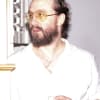Matthew Houck's career could have gone a couple ways. As Phosphorescent, he initially occupied the burned-out freak folk landscape of New York, coming in on the tail end of a post-Devendra Banhart, post-utopian California folk revitalization landscape, his voice a dark mirror to that scene, pregnant with cracked, casual turns of phrase. Houck's brand of folk was—is—sadder, more fragile, a product of lurking rusty Brooklyn warehouses and playing drunk impromptu shows through his rise to success, which has been slow and steady and not without a few hiccups.
Watching Houck and the rotating cast of characters that have made up Phosphorescent's live band on stage at Bowery Ballroom—multiple keyboards and a sort of wobbly Last Waltz vibe that promises freewheeling jams more than laser-focused renditions of album tracks—all I could think about was the commonly-used shorthand to describe the moment when an artist crosses over into the world of festivals: "stadium ready." Is Phosphorescent stadium ready? The short answer is yes, they are, whether they want to be or not.
Muchacho, Houck's latest release, is a deeply personal work blown out into anthems. Like past albums (2007's Pride is a personal favorite), Muchacho trades in heartbreaking quietness and dusky introspection, only now the songs are written for the singalong set. "Song For Zula," one of the album's many highlights, is constructed from languorous strings and a sort of dubby bass stab that brings to mind U2 at their most sincere, and best. Live, the song drew the biggest applause, the most audience makeouts, the most precarious leans over the upstairs railing in an effort to get closer to Houck and the rest of his band.
Thirty minutes into the set, the band exited, leaving Houck alone on the stage. Solo, he played Pride's centerpiece, "Wolves," which still holds all the intimate charm it did when it first appeared. This is no easy feat. It fit well into hushed sets at small clubs, but a sold-out crowd at the Bowery Ballroom jostling for nonexistent space to get just that much closer to Houck's frizzy hair? It could've gone wrong. Audience chatter can kill a song like "Wolves," but Houck is a commanding stage presence, able to hold court with self-deprecating swagger. When someone snatched his set list, he mentioned that he actually kind of needed it because he wasn't "a smart man."
Maybe it's this aw shucks demeanor that got him where he is now. It very easily could have gone the other way—Houck could have been a perpetually marginal figure, cranking out cult classics to an audience that didn't really care if five or a thousand people ever saw him play. But here he is, simultaneously barely able to understand his success and so clearly welcoming it. It's a weird place to be, but it's not a bad one.

